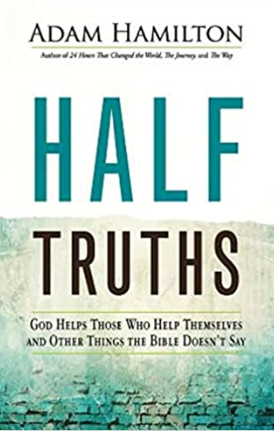adam hamilton
Rev. Adam Hamilton (born July 12, 1964) is the senior pastor of the 20,000 member United Methodist Church of the Resurrection in Leawood, Kansas. It is the largest United Methodist congregation in the United States, measured by weekend attendance. Average weekly attendance for all campuses was 10,274 people for 2012. The congregation has expanded to several sites in the Kansas City area, including an online congregation. Rev. Hamilton has received numerous awards, including two honorary doctorates, the B'nai B'rith award in Social Ethics, the Denman Award in Evangelism, and the Circuit Rider Award for excellence in church leadership. He was named one of the "Ten People to Watch in America's Spiritual Landscape" by Religion & Ethics Newsweekly and Distinguished Evangelist of the United Methodist Church by the Foundation for Evangelism. He is a Trustee at Saint Paul School of Theology and as a member of the Kansas East Board of Professional Ministry. He lectures on leadership, evangelism, and preaching across the country. Hamilton spoke at the 2010 Willow Creek Leadership Summit on the topic of leaders and the power of temptation. Following the second inauguration of President Barack Obama, Hamilton delivered the sermon at the Inaugural Prayer Service held at the National Cathedral in Washington, D.C. on January 22, 2013.
SMU Perkins’ Grad Adam Hamilton Tackles Doubt, Faith, Hope
When Paul Rasmussen began pursuing his Master of Divinity in 2000, a pastor who graduated a dozen years earlier already had legendary status at SMU’s Perkins School of Theology. “There was always this guy out in front of us named Adam Hamilton who we looked to for everything I did at that time,” the now Rev. Rasmussen recalled recently. “Every time I was in his company, I learned, and I learned a whole lot,” Rasmussen said. “He was what we aspired to be back in the day in seminary.” After graduating from Perkins, Hamilton returned to the Kansas City area to start a church for the non-religious or nominally religious.
Founded in 1990, the Church of the Resurrection in Leawood, Kansas, now has five locations and is the largest United Methodist church in the United States. (People Newspapers 3/4/24) READ MORE>>>>>
When Paul Rasmussen began pursuing his Master of Divinity in 2000, a pastor who graduated a dozen years earlier already had legendary status at SMU’s Perkins School of Theology. “There was always this guy out in front of us named Adam Hamilton who we looked to for everything I did at that time,” the now Rev. Rasmussen recalled recently. “Every time I was in his company, I learned, and I learned a whole lot,” Rasmussen said. “He was what we aspired to be back in the day in seminary.” After graduating from Perkins, Hamilton returned to the Kansas City area to start a church for the non-religious or nominally religious.
Founded in 1990, the Church of the Resurrection in Leawood, Kansas, now has five locations and is the largest United Methodist church in the United States. (People Newspapers 3/4/24) READ MORE>>>>>
‘Like a revival’: UMC bishops talk of ‘a future with hope’ after over 6K churches depart
United Methodist Church bishops have expressed optimism over the direction of their denomination after more than 6,400 congregations have voted to leave, with some saying the aftermath of the separation within their conferences has felt like a "revival." The Church of the Resurrection of Leawood, Kansas, a UMC megachurch headed by the Rev. Adam Hamilton, held a panel of three bishops at its Leadership Institute late last month.
(Michael Gryboski/Christian Post 10/12/23)
READ MORE>>>>>
United Methodist Church bishops have expressed optimism over the direction of their denomination after more than 6,400 congregations have voted to leave, with some saying the aftermath of the separation within their conferences has felt like a "revival." The Church of the Resurrection of Leawood, Kansas, a UMC megachurch headed by the Rev. Adam Hamilton, held a panel of three bishops at its Leadership Institute late last month.
(Michael Gryboski/Christian Post 10/12/23)
READ MORE>>>>>
This Kansas church group was headed to Israel. A day before they docked, the war began
When Johnson County Rev. Adam Hamilton heard about the war in Israel, he was standing on a ship in front of nearly 500 people, preparing them for a pilgrimage into the Holy Land planned for the next day. The pastor at The United Methodist Church of the Resurrection in Leawood said his heart immediately went out to the Israelis and Palestinians suffering. He prayed. On Sunday, the ship filled with 480 members of the United Methodist Church, including 30 from Hamilton’s congregation, was supposed to dock in Ashdod, a port city between Gaza and Tel Aviv. (Yahoo 10/11/23) READ MORE>>>>>
When Johnson County Rev. Adam Hamilton heard about the war in Israel, he was standing on a ship in front of nearly 500 people, preparing them for a pilgrimage into the Holy Land planned for the next day. The pastor at The United Methodist Church of the Resurrection in Leawood said his heart immediately went out to the Israelis and Palestinians suffering. He prayed. On Sunday, the ship filled with 480 members of the United Methodist Church, including 30 from Hamilton’s congregation, was supposed to dock in Ashdod, a port city between Gaza and Tel Aviv. (Yahoo 10/11/23) READ MORE>>>>>
April 28, 2023: Laurinburg Exchange: Methodist churches share thoughts on disaffiliation decisions
In the 2001 book “Confronting the Controversies: Biblical Perspectives on Tough Issues”, author Adam Hamilton correctly prognosticated that within the next 20 years, the issue of homosexuality (and now LGBTQ rights) would prove to become a major dividing line in many churches, specifically the United Methodist church.
In the 2001 book “Confronting the Controversies: Biblical Perspectives on Tough Issues”, author Adam Hamilton correctly prognosticated that within the next 20 years, the issue of homosexuality (and now LGBTQ rights) would prove to become a major dividing line in many churches, specifically the United Methodist church.
| May 17, 2022: Why We Are Staying in the UMC | Rev. Adam Hamilton |
 Adam Hamilton Files
Adam Hamilton Files
“I don’t think this is this binary choice. I think there are conservative Christians who have gay kids who say, ‘I want a church that’s going to welcome my kid.’ And I think there are progressive Christians who are ready to embrace same-sex marriage and are more progressive on theology who might be more conservative on other social issues.”
-Pastor Adam Hamilton (May 2022)
 Ashley Morgan Kirk Files
Ashley Morgan Kirk Files
Every week, [Resurrection Senior] Pastor Adam [Hamilton] meets somebody who has never walked into our physical doors before but has been worshiping online with us........We hear from people who aren’t ready to come back in person yet, who are faithfully attending online. … I talk with people each week who aren’t geographically close to us but who are identifying as Resurrection people.............online church has been a method” for some who regularly attended before the pandemic to keep up, her congregation has “also seen new people join us. ....For some in Kansas City who are new to us, online worship is their screen door to our physical front doors at our locations." ....She drew a parallel to Methodism founder John Wesley’s practice of itinerant preaching outside of church buildings........."I think this is the moment in history that’s allowing us one of the biggest opportunities to make the Gospel more available to the general public, just like the work that Wesley did.”
-Ashley Morgan Kirk, Online care and connection pastor; Church of the Resurrection; Kansas City, Kansas 2.2.22
-Ashley Morgan Kirk, Online care and connection pastor; Church of the Resurrection; Kansas City, Kansas 2.2.22
 Justin Schoolcraft Files
Justin Schoolcraft Files
“There’s something about somebody joining on Zoom or digitally, being in their space, being in the space that they call home, where they are familiar, and they are comfortable, that it interestingly makes it a little easier to open up about the movement of God in our lives,” Schoolcraft explained.
“When they’re on Zoom, there’s something about the space that they’re in where they were much more inclined to talk about the person of God and what God was doing in their lives. So I think that’s one of the things that is easier with digital, is the openness and vulnerability.”
--Justin Schoolcraft; Provisional Deacon in the United Methodist Church; Leawood location. 2.2.22
“When they’re on Zoom, there’s something about the space that they’re in where they were much more inclined to talk about the person of God and what God was doing in their lives. So I think that’s one of the things that is easier with digital, is the openness and vulnerability.”
--Justin Schoolcraft; Provisional Deacon in the United Methodist Church; Leawood location. 2.2.22
 Abingdon Press (April 1, 2016)
Abingdon Press (April 1, 2016)
(April 1, 2016)
“Suffering is not God’s desire for us, but it occurs in the process of life. Suffering is not given to teach us something, but through it we may learn. Suffering is not given to punish us, but sometimes it is the consequence of our sin or poor judgment. Suffering does not occur because our faith is weak, but through it our faith may be strengthened. God does not depend on human suffering to achieve his purposes, but sometimes through suffering his purposes are achieved. Suffering can either destroy us, or it can add meaning to our life.”
― Adam Hamilton, Half Truths: God Helps Those Who Help Themselves and Other Things the Bible Doesn't Say
Pastor Adam Hamilton addresses five well-known sayings often misattributed to Christian Scripture: "Everything happens for a reason"; "God helps those who help themselves"; "God won't give you more than you can handle"; "God said it, I believe it, that settles it"; and "Love the sinner, hate the sin." These common statements, though they contain grains of truth, he writes, are not found in the Bible and can cause divide and create misrepresentation of Christ. He goes on to dissect each of these seemingly bland statements, offers real-life stories that help to clarify their meanings, and considers the principles within each statement from a biblical perspective, noting that taking them literally often falls short of Christ's teachings. Hamilton's work here is interesting and somewhat denser than the title suggests. Christians open to discovering inspiration in non-traditional sources will appreciate this fresh perspective on often misused aphorisms.
“Suffering is not God’s desire for us, but it occurs in the process of life. Suffering is not given to teach us something, but through it we may learn. Suffering is not given to punish us, but sometimes it is the consequence of our sin or poor judgment. Suffering does not occur because our faith is weak, but through it our faith may be strengthened. God does not depend on human suffering to achieve his purposes, but sometimes through suffering his purposes are achieved. Suffering can either destroy us, or it can add meaning to our life.”
― Adam Hamilton, Half Truths: God Helps Those Who Help Themselves and Other Things the Bible Doesn't Say
Pastor Adam Hamilton addresses five well-known sayings often misattributed to Christian Scripture: "Everything happens for a reason"; "God helps those who help themselves"; "God won't give you more than you can handle"; "God said it, I believe it, that settles it"; and "Love the sinner, hate the sin." These common statements, though they contain grains of truth, he writes, are not found in the Bible and can cause divide and create misrepresentation of Christ. He goes on to dissect each of these seemingly bland statements, offers real-life stories that help to clarify their meanings, and considers the principles within each statement from a biblical perspective, noting that taking them literally often falls short of Christ's teachings. Hamilton's work here is interesting and somewhat denser than the title suggests. Christians open to discovering inspiration in non-traditional sources will appreciate this fresh perspective on often misused aphorisms.
 Adam Hamilton Files
Adam Hamilton Files
I don't believe God makes is gay or straight. I think sexual orientation is developed in moist of us at a very early age through some combination of nature and nurture. Heterosexuality is normative, but roughly 5% of the population is drawn to someone of the same gender in the same way that heterosexuals are drawn to the opposite gender. Is it possible that God might look at this gay and lesbian child and say, "It is not good that this one should be alone; I will make them a helper as their companion"?......Currently the United Methodist Church says that gay and lesbian couples cannot enter into this kind of covenant. They cannot receive God's blessings upon their love within our churches and from pastors because, according to our Discipline to share their lives together as companions in this kind of covenant is "incompatible with Christian teaching." We teach, in essence, that God says of gay and lesbian people that it is good for them to be alone." -- Pastor Adam Hamilton (July 12, 2015)

